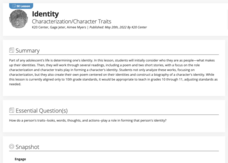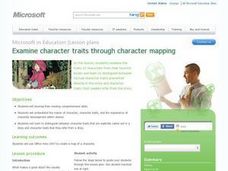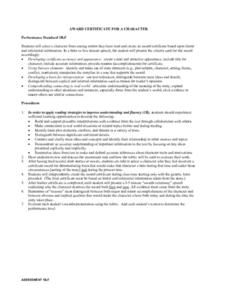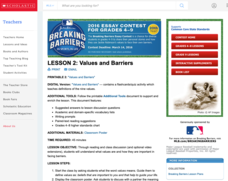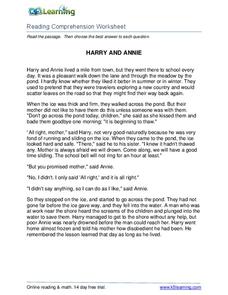Teacher Web
Inferring Character Traits
Learning how to draw inferences from text is a key reading comprehension skill. Here's a worksheet that gives readers a chance to practice by offering 20 descriptive sentences and asking kids to identify the inferred character...
Curated OER
Inferring Character Traits
Here is a lesson which is "flexible," and can operate as an individual or whole class activity. After reading a book of their choosing, with the use of a semantic map, learners identify character traits. They infer how their feelings...
2012 Teaching Resources
Analyzing Character Traits
Character analysis becomes easy with a 24-page packet packed with mini-lessons, graphic organizers, and activities. A must-have for your curriculum library.
Polk Bros Foundation
I Can Identify and Infer Character Traits
Use the guiding questions on this page to fill out the two graphic organizers included in the materials tab. All of the materials focus on character or personality traits and ask pupils to find textual evidence of the traits they...
K20 LEARN
Identity: Characterization/Character Traits
"Who am I?" Guy de Maupassant's short story "The Necklace," Julio Naboa Polanco's poem "Identity," and a clip from a Jason Bourne film provide learners with a context to consider the traits that makeup identity. Scholars create a...
Curated OER
Examining Character Traits through Character Mapping
Some of what we know about a character is directly stated. Some of what we know is inferred by events in the story. Character maps help primary learners recognize the difference. After modeling with a story your class has read, pupils...
Curated OER
5th Grade Historical Fiction: Solder's Letter
A picture is worth a thousand words, but sometimes a single word can go a long way as well. Practice making inferences about character traits with a letter written from the perspective of a soldier in the American Revolution.
Curriculum Corner
Inferencing
Inferencing is a necessary reading skill to uncover non-explicit messages in text. Use the set of resources as a way to guide learners toward becoming expert inferrers through reading prompts and literature with text and without text.
Curated OER
AWARD CERTIFICATE FOR A CHARACTER
Connect to real-world experiences by having your primary learners create an award certificate based upon literal and inferential information from a story. They present the award to a character from a story and explain the criteria used....
Curated OER
Character, You Say? Prove It!
Students discuss character traits, and complete a character map and a Venn diagram for selected characters in their assigned text.
Curated OER
Henry and Mudge: comprehension skills
In this comprehension skills worksheet, students read the book Henry and Mudge and complete comprehension activities. Students complete activities such as inferences, drawing conclusions, character traits, and main idea and...
Curated OER
Michelle Kwan: Heart of a Champion
Who is a champion to your class? Elementary and middle schoolers think of a role-model from their lives. Then, in their journals, they write evidence of that person's perseverance. They identify the character trait of perseverance with...
Roald Dahl
Fantastic Mr. Fox
A fancifully illustrated guide to Roald Dahl's Fantastic Mr. Fox, this series of lessons, activities, and tasks could be used in its entirety or picked apart and used piecemeal. Have young readers investigate the role of dialogue in...
Polk Bros Foundation
I Can Infer Motive and Effects for an Action
Help your pupils determine just what makes a character or person tick by zooming in on one character or person. This graphic organizer is dedicated to analyzing one person and asks pupils to infer a personality trait, note down an action...
August House
The Great Smelly, Slobbery, Small-Tooth Dog
Read the story The Great Smelly, Slobbery, Small-Tooth Dog: A Folktale from Great Britain by Margaret Read MacDonald and choose from multiple activities to learn about the tale's theme—kindness. With so many options, your kind kids will...
Scholastic
Lesson 2: Values and Barriers
Scholars investigate and discuss the importance of values and how they can be used to break barriers. Small groups work collaboratively to examine the text and draw inferences to answer questions. A writing assignment challenges pupils...
K5 Learning
Harry and Annie
Henry and Annie are on thin ice—literally! Read about the siblings' winter walk and the importance of staying safe with a short passage and four follow-up questions.
Novelinks
Touching Spirit Bear: The Literary Mandala
Even someone with a dark side can make a good decision—and vice versa. Readers explore Cole's traits and decisions in Ben Mikaelson's Touching Spirit Bear and analyze his sunside and...
Curated OER
Using Wordless Comics To Help Create Meaning in Reading
Use picture cues as a tool in order to create meaning along with text. With a wordless comic, young illustrators discuss the main idea and character traits, and independently write a summary for a page of a wordless comic. This strategy...
Pottsgrove School District
Tall Tales
Young readers compare and contrast digital and print versions of tall tale text. The resource includes a character analysis in which pupils compare and contrast traits, and make inferences about what the characters do and say. They...
Curated OER
LETTER FROM ONE CHARACTER TO ANOTHER
Fourth graders read stories and pick one with characters they find interesting. Then students create a dialogue of writing a letter from one character to another. The letter must relate to the original story in some way that can easily...
Orange County Department of Education
Integrity and a Boy Called Slow
Fifth graders identify the character trait of integrity in the main character, Slow, in "A Boy Called Slow." They participate in a discussion to determine what steps the main character took to earn his new name. Students write an essay...
Curated OER
Details, Details: How Choices Reveal Character, Setting, Tone, and Theme. (Analyzing and Interpreting, Making Inferences)
Students respond to works of art. In this art interpretation lesson, students examine images of art while using concepts they learned as they read literary pieces. They detail the setting, characters, and the mood and theme of the works...
Curated OER
Maus: After Reading Strategy Instructional Routine
Class members create literary mandalas for two characters from Maus, Art Spiegelman’s graphic novel about his father’s experiences with the Holocaust. After finding quotes that reveal three good traits and three bad traits of each...






